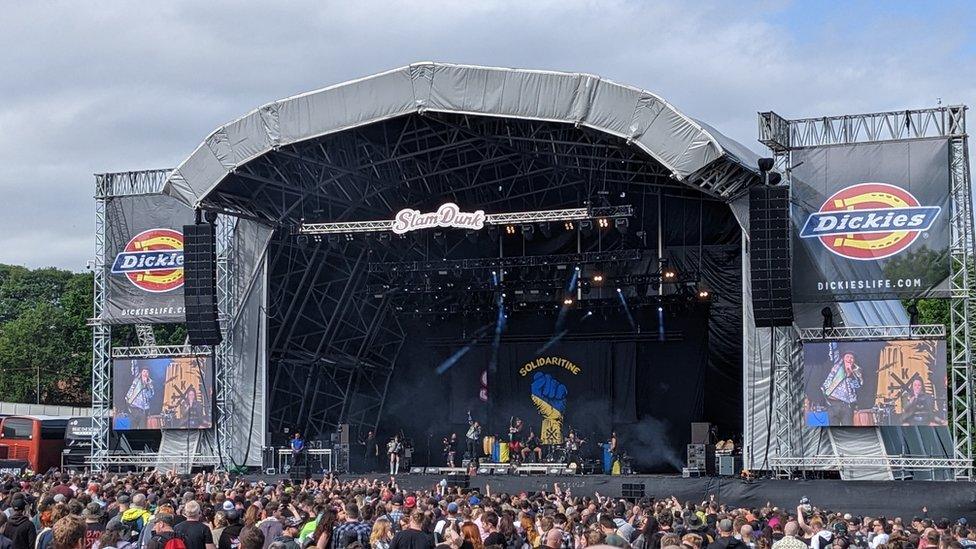Is the rock scene still a boys' club?
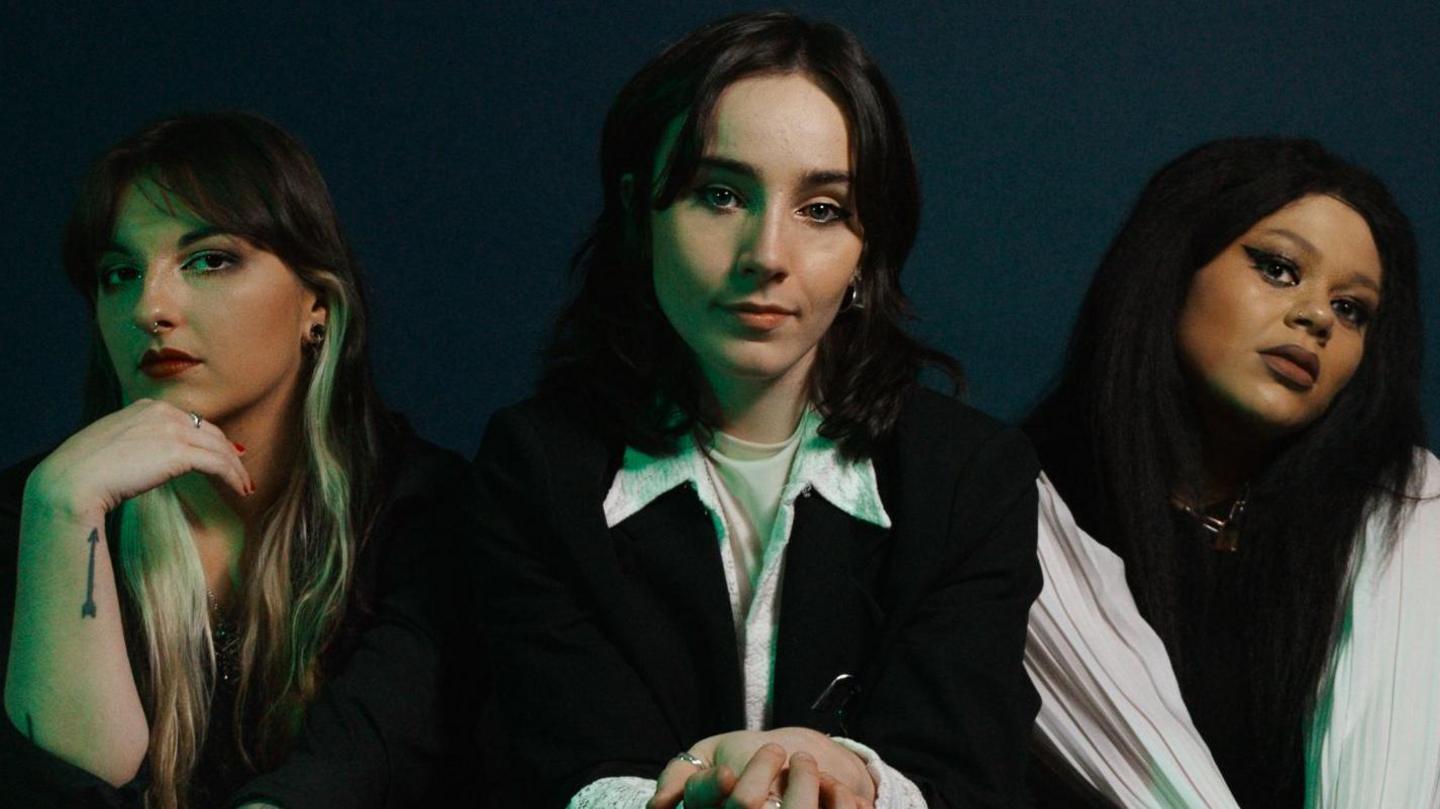
Cherym say women are so under-represented in the industry, they're often mistaken for other band's girlfriends when they show up to gigs
- Published
"When we first started in the music industry, it was pretty much a boys' club," says Hannah Richardson, Cherym's lead singer and guitarist.
"We were like, why can't girls do it? There's no reason why we can't."
Hannah makes up the Londonderry punk trio with Alannagh Doherty and Emer McLaughlin and says the industry - particularly the alternative music scene - is still not where it needs to be when it comes to equality and diversity.
That was thrown into focus when earlier this week, Slam Dunk festival revealed part of its 2025 line-up, featuring only two acts that included women.
"I'm so sick of seeing of seeing line-ups that are predominantly cis, straight, white men all the time," Hannah tells BBC Newsbeat.
"Because it's not just women that are overlooked. It's black people, it's trans people, it's marginalised people in general."
The band's drummer and singer Alannagh adds that women are so overlooked in the industry, they're often mistaken for other bands' girlfriends when they show up to gigs.
"We have to constantly prove ourselves and prove that we're worthy of what we're doing," she says.
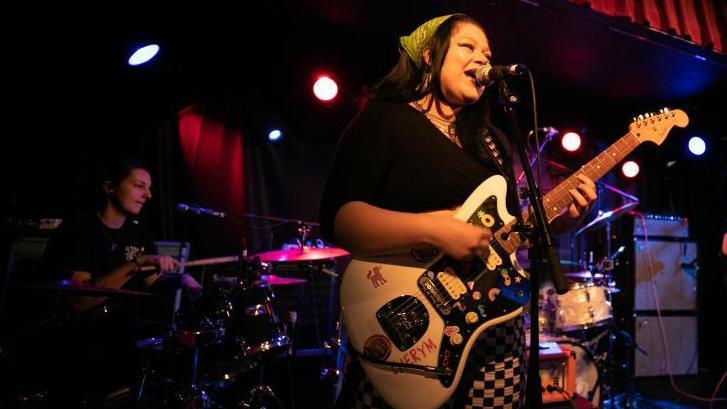
Hannah says the music industry is a "boys' club" and female artists can be overlooked
Slam Dunk revealed its first line-up announcement on Wednesday for its festivals in Leeds and Hatfield, featuring bands including The Used, A Day To Remember and Neck Deep.
Of the 20 featured acts, only two - Delilah Bon and Dream State - included female musicians, sparking a disappointed reaction from fans.
"It's giving, 'for a dollar, name a woman'," Alannagh says.
Slam Dunk is one of the UK's biggest independent rock festivals and its spokesperson declined to say anything about the line-up announcement when approached by Newsbeat.
They said it wouldn't be appropriate or proportionate to comment when about half of its acts were yet to be confirmed.
But Alannagh thinks the backlash against the line-up poster is "justified".
"It's like putting out a trailer for a film," she says.
"It's the first look and the look is 99% male."
Allow X content?
This article contains content provided by X. We ask for your permission before anything is loaded, as they may be using cookies and other technologies. You may want to read X’s cookie policy, external and privacy policy, external before accepting. To view this content choose ‘accept and continue’.
Research by the BBC in 2017 found that 80% of festival headliners were male and dozens of festivals went on to pledge to achieve a 50/50 gender split by 2022.
But by the time 2022 arrived, Newsbeat discovered that only one in 10 headliners at the UK's top music festivals were women that summer.
In 2018, campaign group Keychange presented a manifesto to the European Parliament calling for more to be done to improve representation in the industry.
This year, it released a second manifesto , externalrenewing that call, along with other measures to make the music industry more equitable.
Slam Dunk's 2024 line-up poster featured five acts that included women out of the 27 that were advertised - about 20% - while in 2023, it was five out of 22, or 23%.
Meanwhile Download, which is a bigger rock festival spread across three days, filled 32 of its 111 slots - just under 30% - with acts featuring women and non-binary artists this summer.
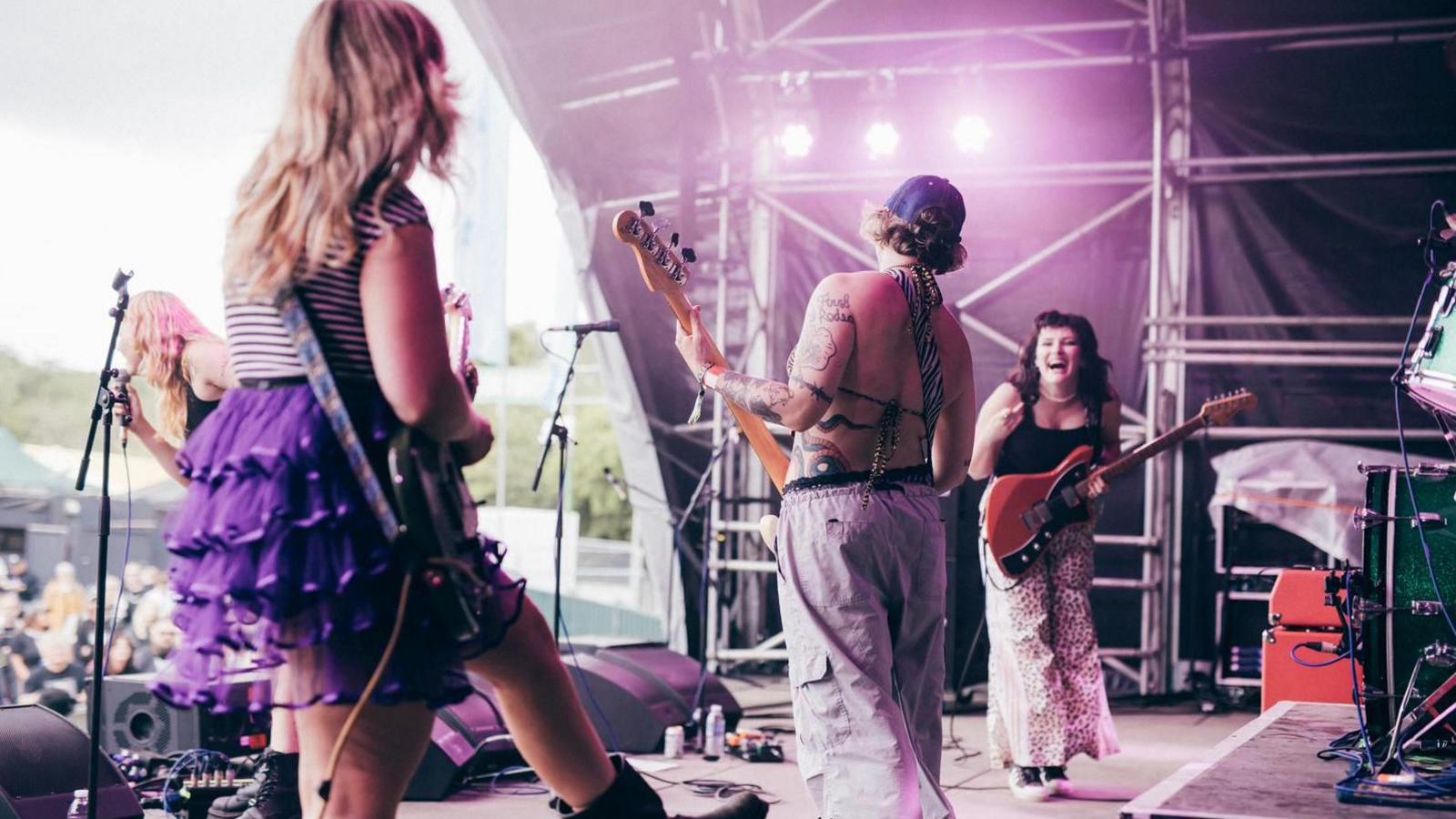
Panic Shack have performed at festivals over the summer and are working on their debut album
Seeing the lack of representation is "literally why we started," says Megan Fretwell from Panic Shack, an alternative girl group from Cardiff who blew up on TikTok for their viral track The Ick.
"Women aren't even encouraged to try," she says. "We've had to build our confidence over time.
"[Festivals] might argue that there's not as many girls or women on the scene.
"But look a little harder."
Megan says fans might also think there aren't enough "headline worthy" female acts but says she'd urge them to "question why that might be".
"Women need to be given these opportunities to boost our profiles," she says.
"Where can we start to build up that ladder to headliner status? It's hard, and we've been grafting at this for years now."
She says the band's inspired by other female acts including Spice Girls and Girls Aloud but they're "few and far between" in the alternative scene - something they want to change.
"If a teenage girl watches us and feels in any way inspired to pick up a guitar then our job is done," says Megan.
'Representation needs to be there from day one'
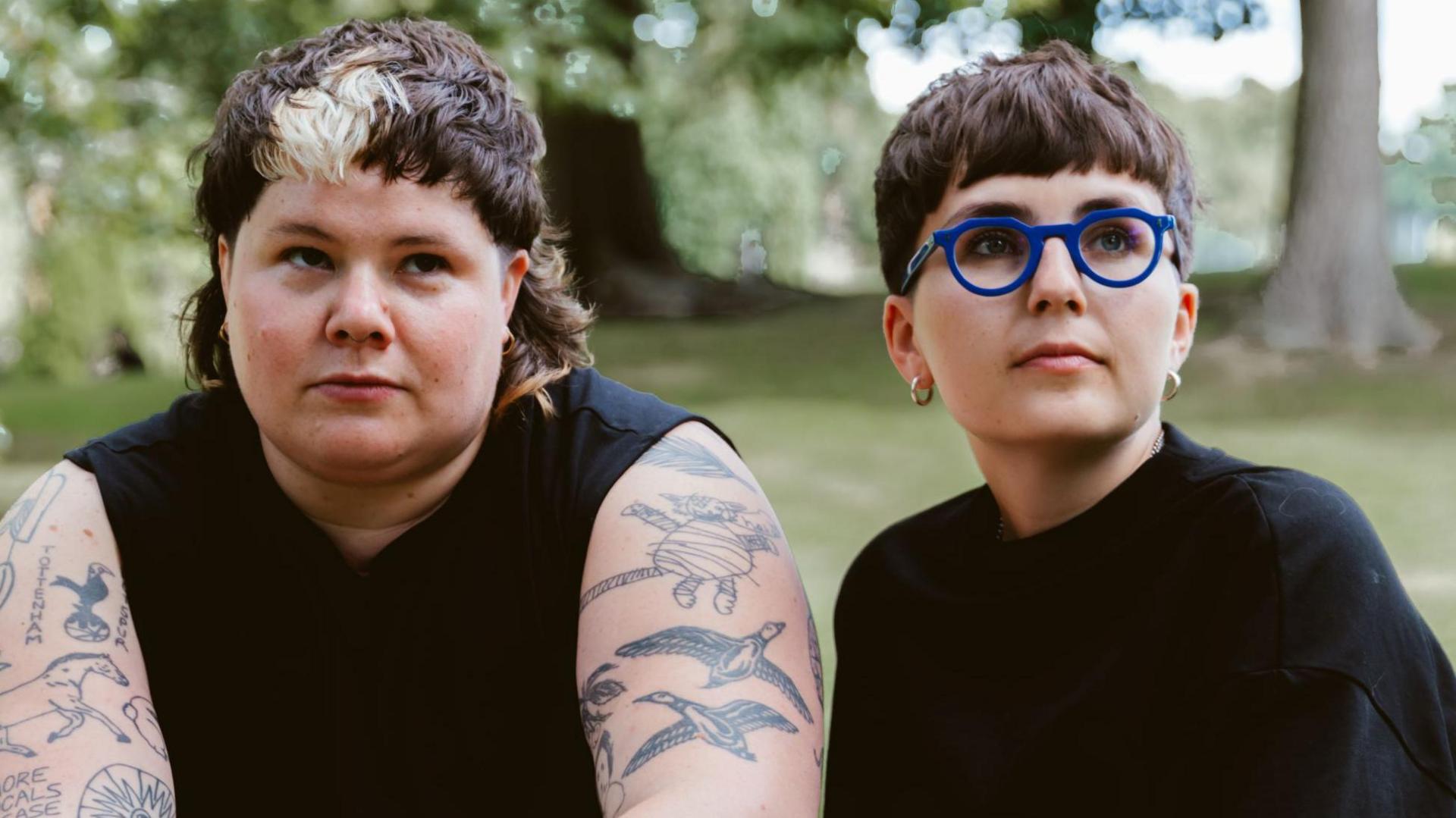
Hanni, one half of ARXX, says they weren't surprised by the lack of representation in the line-up
Hanni Pidduck and Clara Townsend make up two halves of Brighton duo ARXX and describe their sound as "like Taylor Swift if she only ever listened to Nirvana".
Hanni tells Newsbeat when they saw the Slam Dunk line-up they weren't surprised - "sadly".
"You can be outraged but it's still not surprising. It's really upsetting that we're still at that point."
The singer and guitarist, who identifies as non-binary, says representation is simply "not there".
"The feeling and the general experience right now is that opportunities are afforded much more for a certain demographic," they say.
"And because of that, they're then taken away from women and other marginalised communities."
For that to change, Hanni says diversity needs to be seen as an opportunity and not "a problem".
"You need someone to actively say, 'This year's going to be different'," they say.
"And part of the problem is no one's deciding that."
Slam Dunk would have been "naive" not to expect some backlash to the line-up announcement, Hanni says, and even though more acts are yet to be revealed, they agree with Alannagh that it doesn't set the best tone for what to expect.
"If you're embracing the idea that representation is a positive thing, then I think you would understand that that needs to come from day one," they say.
'Breaking down stigmas'
Cherym, Panic Shack and ARXX all agree the alternative scene can be a "boys' club".
In other genres though, 2024 has been punctuated by women breaking records, from Taylor Swift's Eras tour, to Sabrina Carpenter's chart domination and Glastonbury having two female headliners for the first time.
Megan says outside of those genres, there's an element of "gatekeeping" from women and Hannah says there can be an expectation of the kinds of music they should make.
"There was an assumption that we made a particular type of music because we're women," she says of when Cherym first started performing.
"It's about breaking down those stigmas and taking people for what they are."
Hanni says they had a similar experience, starting in music by playing "folksy, country music".
"I don't think that's the music I was wanting to make," they say.
"I think it's the music I thought I had to make."
And they say it's only through better representation that aspiring artists have the opportunity to "embrace all the other possibilities".
"It can't be stressed how important representation is," they say.
"You learn what's possible from what you see."

- Published24 May 2024
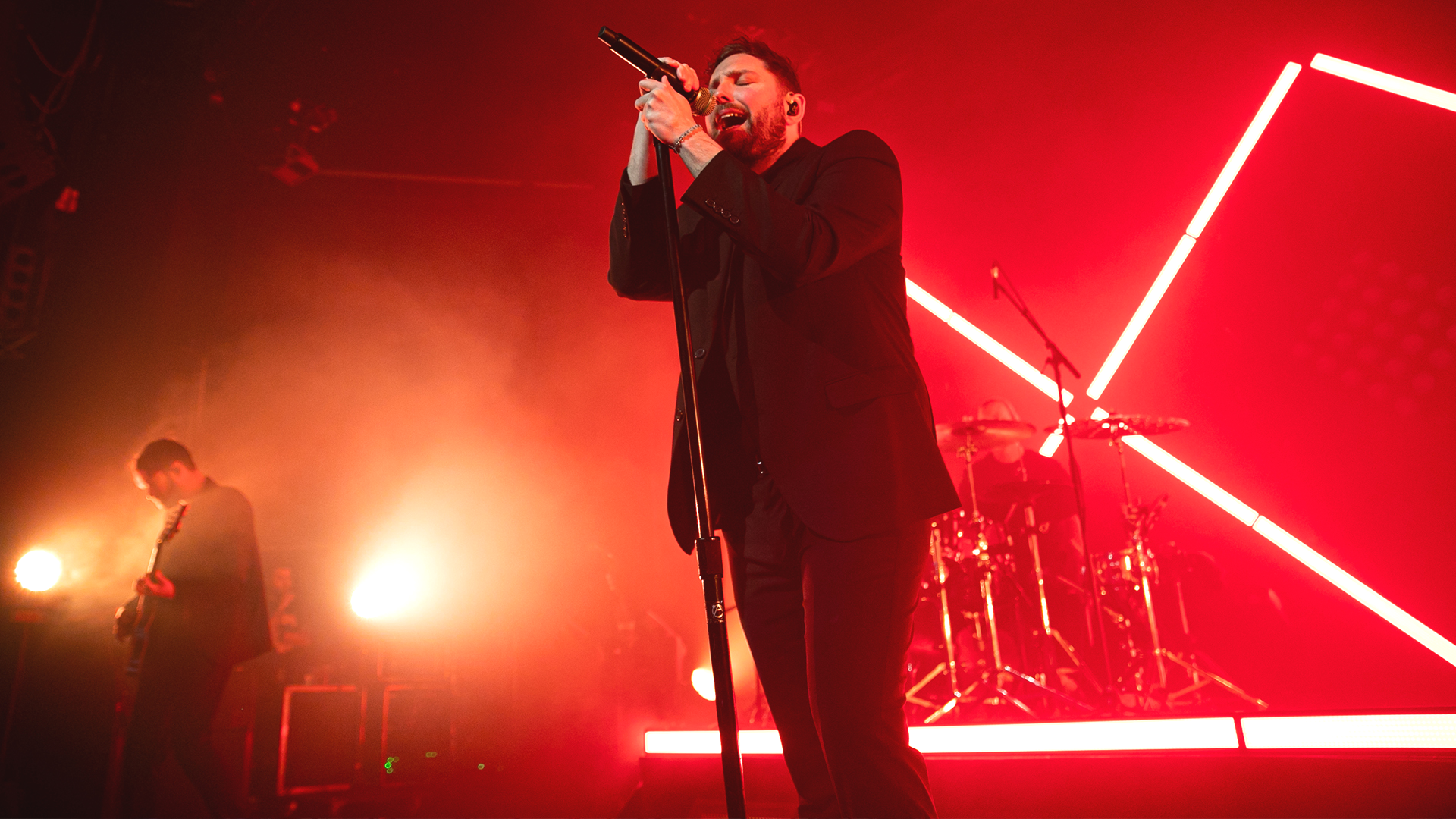
- Published31 May 2023
